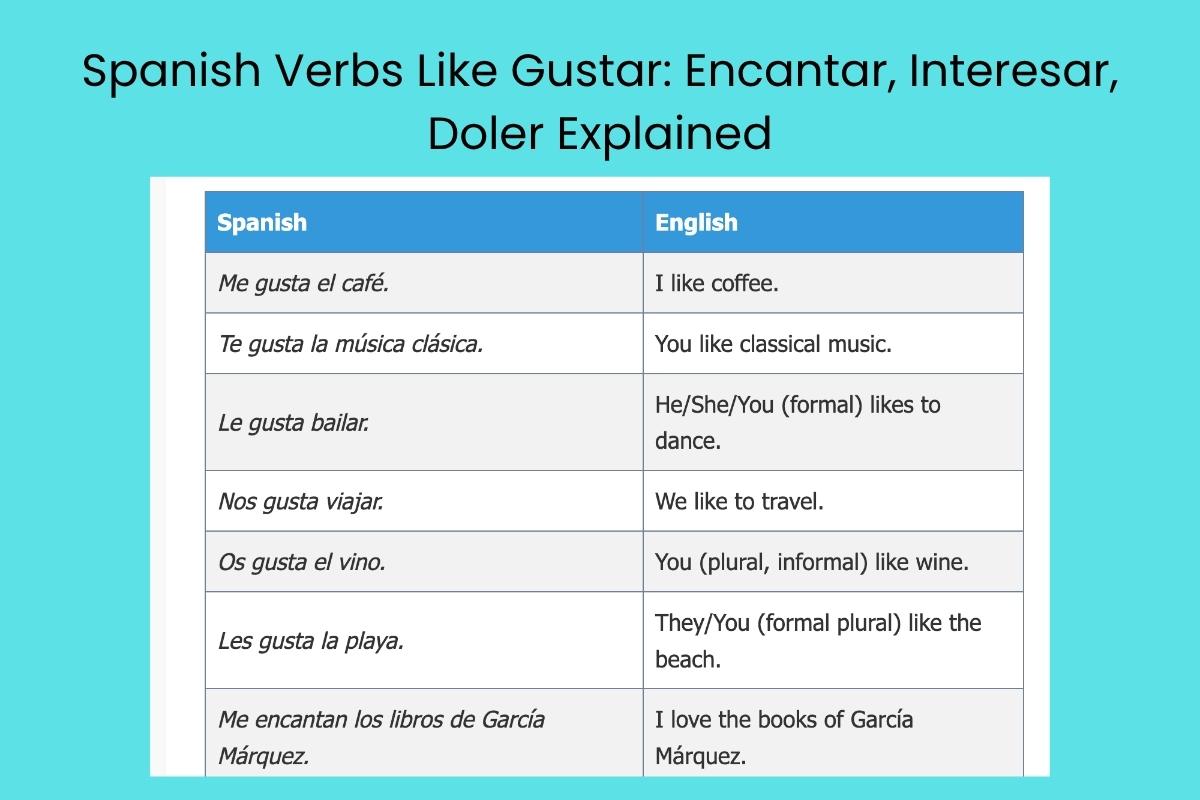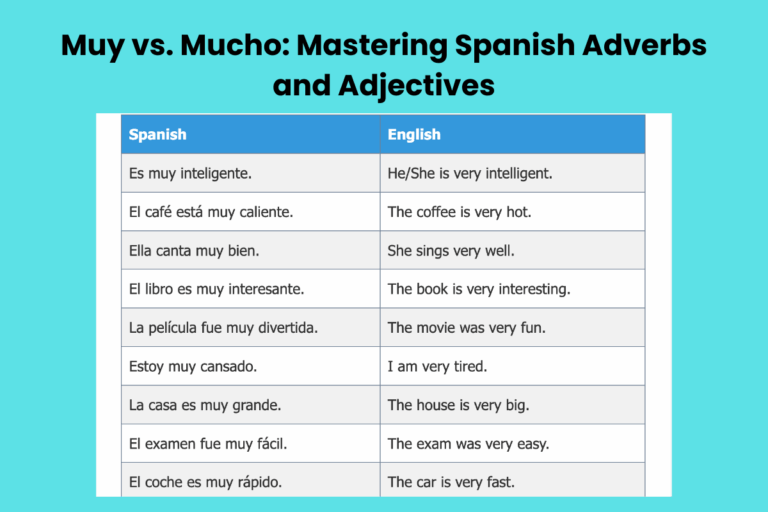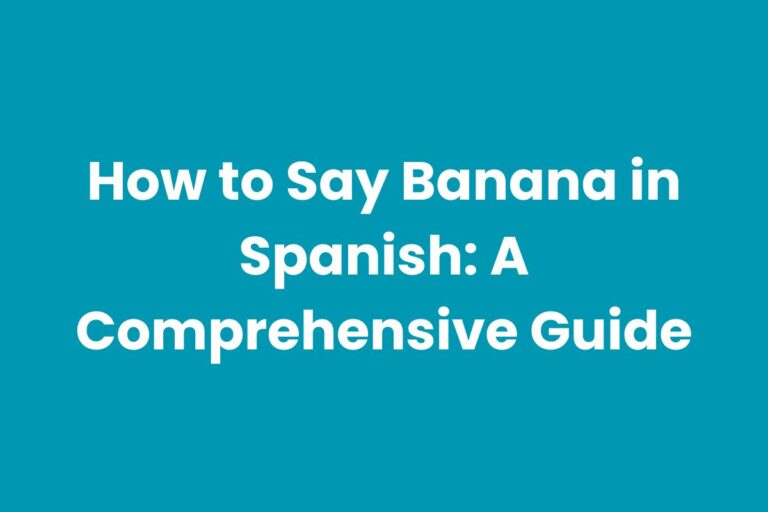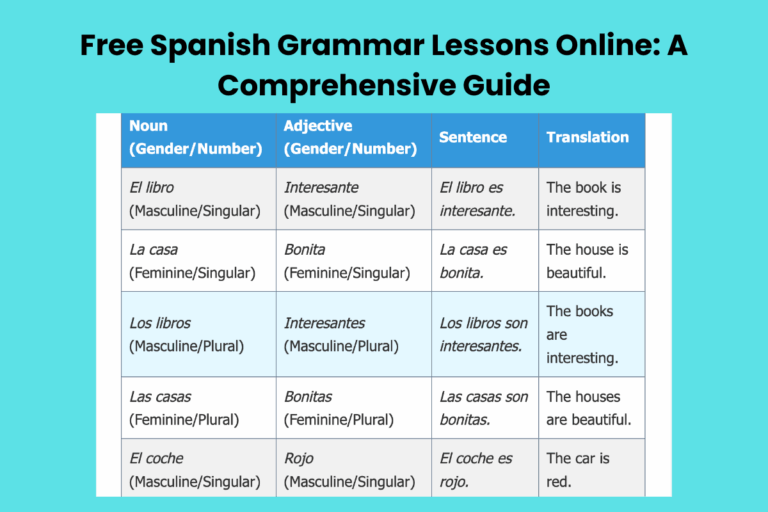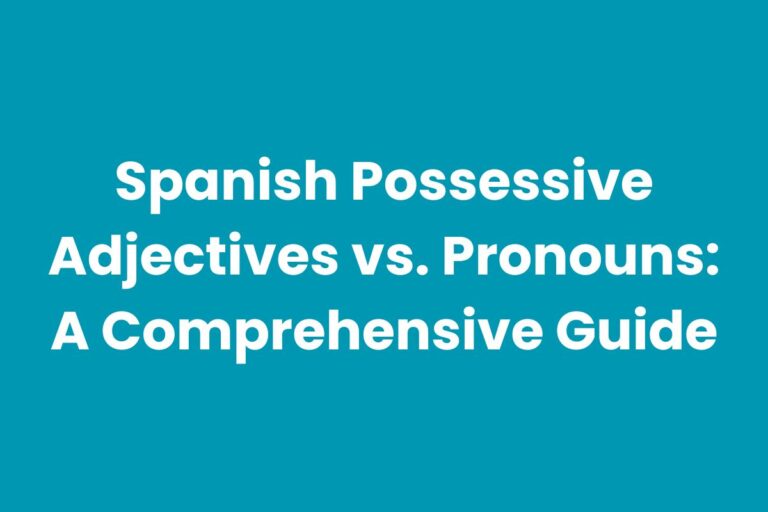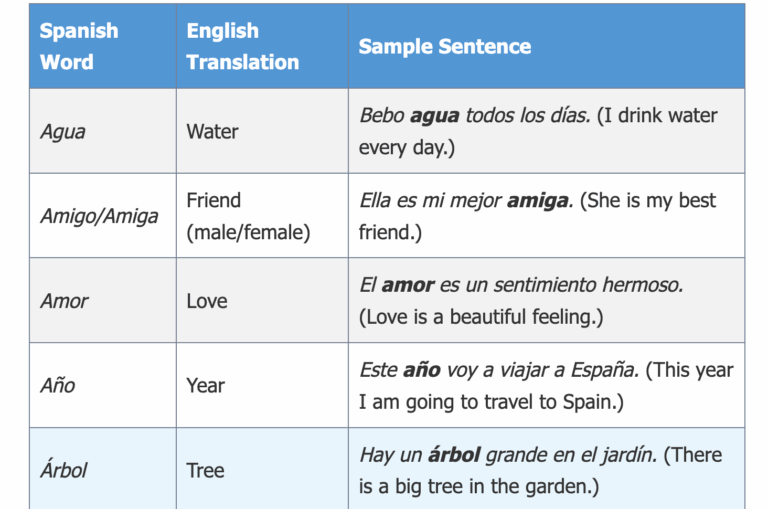Spanish Verbs Like Gustar: Encantar, Interesar, Doler Explained
Understanding verbs like gustar (to like) in Spanish is crucial for expressing preferences, interests, and feelings. These verbs function differently from typical English verbs because the subject of the sentence is not the person experiencing the feeling, but rather the thing that causes the feeling. Mastering these verbs—including encantar (to love, to be enchanted by), interesar (to interest), and doler (to hurt)—will significantly enhance your ability to communicate nuanced emotions and preferences in Spanish. This guide is designed for Spanish learners of all levels, from beginners grappling with basic sentence structure to advanced students seeking to refine their expressive capabilities.
Table of Contents
- Introduction
- Definition of Verbs Like Gustar
- Structural Breakdown
- Types and Categories
- Examples
- Usage Rules
- Common Mistakes
- Practice Exercises
- Advanced Topics
- FAQ
- Conclusion
Definition of Verbs Like Gustar
Verbs like gustar are often referred to as “verbs of emotion” or “psychological verbs.” These verbs describe how something affects a person, rather than an action performed by a person. The key characteristic of these verbs is that the thing or person causing the emotion or feeling acts as the subject of the sentence, while the person experiencing the emotion is represented by an indirect object pronoun. This contrasts with English, where the person experiencing the emotion is typically the subject. Understanding this fundamental difference is essential for using these verbs correctly.
These verbs are classified as impersonal verbs because they often focus on the effect something has on someone, rather than a direct action taken by someone. This is why the structure is different from many other Spanish verbs.
The grammatical subject of the sentence is what is liked, loved, interests, or hurts, and the person experiencing these feelings is denoted by an indirect object pronoun. This structure can be initially confusing for English speakers, but with practice, it becomes more intuitive.
The function of these verbs is to express subjective experiences—feelings, preferences, and reactions. They are used to convey what someone likes, dislikes, is interested in, or is affected by. They are essential for discussing personal preferences and engaging in conversations about interests and emotions. For example, instead of saying “I like the book,” you would say “The book is pleasing to me” (Me gusta el libro).
Structural Breakdown
The basic structure of sentences with verbs like gustar is as follows:
Indirect Object Pronoun + Verb + Subject
Let’s break down each component:
- Indirect Object Pronouns (IOPs): These pronouns indicate who is experiencing the feeling or emotion. The common IOPs are:
- Me (to/for me)
- Te (to/for you, informal)
- Le (to/for him/her/you formal)
- Nos (to/for us)
- Os (to/for you, informal plural, Spain only)
- Les (to/for them/you formal plural)
- Verb: The verb is conjugated to agree with the subject, not with the indirect object pronoun. This is a key point of confusion for many learners. The verb is usually in the third person singular or plural.
- Subject: The subject is the thing or person that causes the feeling or emotion. It can be a noun, pronoun, or infinitive phrase.
For emphasis or clarification, you can add the preposition a followed by a pronoun or noun before the indirect object pronoun. For example: A mí me gusta el chocolate. (I like chocolate). This clarifies who is being referred to, especially with le and les, which can be ambiguous.
Here’s a table summarizing the structure:
| Element | Function | Example |
|---|---|---|
| Indirect Object Pronoun | Indicates who is experiencing the feeling | Me, Te, Le, Nos, Os, Les |
| Verb | Conjugated to agree with the subject | Gusta, Gustan, Encanta, Encantan |
| Subject | The thing or person causing the feeling | El libro (the book), Los libros (the books) |
Types and Categories
Several verbs in Spanish follow the same grammatical structure as gustar. These verbs can be broadly categorized based on the type of emotion or feeling they express:
Verbs Expressing Liking or Preference
These verbs indicate a positive reaction or preference towards something.
- Gustar (to like): The most common verb in this category, expressing general liking.
- Encantar (to love, to be enchanted by): Expresses a stronger liking than gustar, almost like being in love with something.
- Fascinar (to fascinate): To be fascinated by something.
Verbs Expressing Interest
These verbs indicate that something is interesting to someone.
- Interesar (to interest): Indicates that something holds someone’s attention or curiosity.
- Importar (to matter, to be important): Indicates that something is important to someone.
Verbs Expressing Physical or Emotional Impact
These verbs describe how something affects someone physically or emotionally.
- Doler (to hurt, to ache): Indicates physical or emotional pain.
- Molestar (to bother, to annoy): Indicates that something is bothersome or annoying.
- Preocupar (to worry): Indicates that something causes worry or concern.
Other Common Verbs Like Gustar
- Quedar (to remain, to fit): Can indicate how something fits (clothing) or how much is left.
- Tocar (to be one’s turn, to be necessary): Indicates that it is someone’s turn or that something is necessary.
Examples
Here are examples of how to use these verbs in sentences, categorized by the type of verb.
Examples with Gustar and Encantar
This table provides examples of sentences using gustar and encantar, showcasing how these verbs express liking or strong preference. The indirect object pronoun indicates who is experiencing the liking, while the subject is what is being liked.
| Spanish | English |
|---|---|
| Me gusta el café. | I like coffee. |
| Te gusta la música clásica. | You like classical music. |
| Le gusta bailar. | He/She/You (formal) likes to dance. |
| Nos gusta viajar. | We like to travel. |
| Os gusta el vino. | You (plural, informal) like wine. |
| Les gusta la playa. | They/You (formal plural) like the beach. |
| Me encantan los libros de García Márquez. | I love the books of García Márquez. |
| Te encanta el chocolate. | You love chocolate. |
| Le encanta la jardinería. | He/She/You (formal) loves gardening. |
| Nos encanta pasar tiempo con amigos. | We love spending time with friends. |
| Os encantan las películas de terror. | You (plural, informal) love horror movies. |
| Les encanta la comida picante. | They/You (formal plural) love spicy food. |
| A mí me gusta mucho el verano. | I really like summer. |
| A ti te gusta leer novelas históricas. | You like to read historical novels. |
| A él le gusta jugar al fútbol. | He likes to play soccer. |
| A ella le gusta cantar en la ducha. | She likes to sing in the shower. |
| A nosotros nos gusta ir al cine los viernes. | We like to go to the movies on Fridays. |
| A vosotros os gusta esquiar en la nieve. | You (plural, informal) like to ski in the snow. |
| A ellos les gusta explorar nuevos restaurantes. | They like to explore new restaurants. |
| A mí me encanta la música en vivo. | I love live music. |
| A ti te encanta viajar por el mundo. | You love traveling around the world. |
| A él le encanta cocinar platos exóticos. | He loves to cook exotic dishes. |
| A ella le encanta pintar paisajes al óleo. | She loves to paint oil landscapes. |
| A nosotros nos encanta hacer senderismo en las montañas. | We love hiking in the mountains. |
| A vosotros os encanta bailar salsa en las fiestas. | You (plural, informal) love dancing salsa at parties. |
| A ellos les encanta organizar eventos sociales. | They love to organize social events. |
Examples with Interesar and Importar
This table illustrates the use of interesar and importar, which express interest and importance, respectively. These verbs are crucial for discussing hobbies, concerns, and what matters to someone.
| Spanish | English |
|---|---|
| Me interesa la historia. | I am interested in history. |
| Te interesa la política. | You are interested in politics. |
| Le interesa el arte moderno. | He/She/You (formal) is interested in modern art. |
| Nos interesa el medio ambiente. | We are interested in the environment. |
| Os interesa la tecnología. | You (plural, informal) are interested in technology. |
| Les interesa la literatura. | They/You (formal plural) are interested in literature. |
| Me importa tu opinión. | Your opinion matters to me. |
| Te importa el futuro. | The future matters to you. |
| Le importa su familia. | His/Her/Your (formal) family matters to him/her/you. |
| Nos importa la justicia. | Justice matters to us. |
| Os importa la educación. | Education matters to you (plural, informal). |
| Les importa la salud. | Health matters to them/you (formal plural). |
| A mí me interesa aprender nuevos idiomas. | I am interested in learning new languages. |
| A ti te interesa la astronomía. | You are interested in astronomy. |
| A él le interesa la filosofía. | He is interested in philosophy. |
| A ella le interesa la psicología. | She is interested in psychology. |
| A nosotros nos interesa la cocina internacional. | We are interested in international cuisine. |
| A vosotros os interesa la música indie. | You (plural, informal) are interested in indie music. |
| A ellos les interesa el cine clásico. | They are interested in classic cinema. |
| A mí me importa mucho el bienestar animal. | Animal welfare matters a lot to me. |
| A ti te importa la igualdad de género. | Gender equality matters to you. |
| A él le importa la sostenibilidad del planeta. | The planet’s sustainability matters to him. |
| A ella le importa la calidad de la educación. | The quality of education matters to her. |
| A nosotros nos importa el desarrollo comunitario. | Community development matters to us. |
| A vosotros os importa la preservación cultural. | Cultural preservation matters to you (plural, informal). |
| A ellos les importa la innovación tecnológica. | Technological innovation matters to them. |
Examples with Doler and Molestar
This table presents sentences using doler and molestar, which express pain/hurt and annoyance/bother, respectively. Understanding these verbs is crucial for discussing discomfort and negative feelings.
| Spanish | English |
|---|---|
| Me duele la cabeza. | My head hurts. |
| Te duelen los pies. | Your feet hurt. |
| Le duele el estómago. | His/Her/Your (formal) stomach hurts. |
| Nos duelen las manos. | Our hands hurt. |
| Os duele la espalda. | Your (plural, informal) back hurts. |
| Les duelen los ojos. | Their/Your (formal plural) eyes hurt. |
| Me molesta el ruido. | The noise bothers me. |
| Te molesta el humo. | The smoke bothers you. |
| Le molesta la gente que grita. | He/She/You (formal) is bothered by people who shout. |
| Nos molesta la injusticia. | Injustice bothers us. |
| Os molesta la burocracia. | Bureaucracy bothers you (plural, informal). |
| Les molesta la impuntualidad. | They/You (formal plural) are bothered by tardiness. |
| A mí me duele mucho la rodilla después de correr. | My knee hurts a lot after running. |
| A ti te duelen los dientes cuando comes helado. | Your teeth hurt when you eat ice cream. |
| A él le duele el corazón cuando piensa en ella. | His heart hurts when he thinks about her. |
| A ella le duele la garganta cuando canta mucho. | Her throat hurts when she sings a lot. |
| A nosotros nos duelen los músculos después del gimnasio. | Our muscles hurt after the gym. |
| A vosotros os duele la cabeza después de estudiar mucho. | Your heads hurt after studying a lot. |
| A ellos les duelen los oídos cuando viajan en avión. | Their ears hurt when they travel by plane. |
| A mí me molesta la gente que habla por teléfono en el cine. | People who talk on the phone in the cinema bother me. |
| A ti te molesta que la gente llegue tarde a las reuniones. | It bothers you that people arrive late to meetings. |
| A él le molesta que los niños jueguen con la comida. | It bothers him that children play with food. |
| A ella le molesta que su jefe no la escuche. | It bothers her that her boss doesn’t listen to her. |
| A nosotros nos molesta la contaminación del aire. | Air pollution bothers us. |
| A vosotros os molesta la falta de respeto en las redes sociales. | The lack of respect on social media bothers you. |
| A ellos les molesta que no haya suficiente aparcamiento en la ciudad. | It bothers them that there isn’t enough parking in the city. |
Usage Rules
Using verbs like gustar correctly involves following specific rules:
- Verb Conjugation: The verb is conjugated based on the subject, not the indirect object pronoun. If the subject is singular, use the third-person singular form (e.g., gusta). If the subject is plural, use the third-person plural form (e.g., gustan).
- Indirect Object Pronouns: Always use the correct indirect object pronoun to indicate who is experiencing the feeling.
- Clarification with “A + Pronoun/Noun”: Use “A + pronoun/noun” for emphasis or to clarify who is being referred to, especially with le and les. For example: A ella le gusta el chocolate. (She likes chocolate).
- Infinitive Phrases as Subjects: When the subject is an infinitive phrase (e.g., “to swim”), the verb is always in the singular form. For example: Me gusta nadar. (I like to swim).
- Negative Sentences: Place “no” before the indirect object pronoun. For example: No me gusta el brócoli. (I don’t like broccoli).
- Questions: The structure remains the same in questions. For example: ¿Te gusta el cine? (Do you like the cinema?).
Common Mistakes
Here are some common mistakes learners make when using verbs like gustar:
| Incorrect | Correct | Explanation |
|---|---|---|
| Yo gusto el libro. | Me gusta el libro. | The person experiencing the liking is not the subject. |
| Me gustan el libro. | Me gusta el libro. | The verb must agree with the subject (el libro is singular). |
| Me gusta los libros. | Me gustan los libros. | The verb must agree with the subject (los libros is plural). |
| A mí gusto el café. | A mí me gusta el café. | The indirect object pronoun is required even with “a mí”. |
| Le gusto el libro a ella. | A ella le gusta el libro. | The correct order is “A + pronoun/noun” + IOP + verb + subject. |
Practice Exercises
Exercise 1: Fill in the Blanks with the Correct Indirect Object Pronoun
Complete the following sentences with the correct indirect object pronoun (me, te, le, nos, os, les).
| Question | Answer |
|---|---|
| 1. A mí ______ gusta mucho el helado. | me |
| 2. A ti ______ interesa la ciencia ficción. | te |
| 3. A él ______ duele la espalda. | le |
| 4. A nosotros ______ encanta viajar por Europa. | nos |
| 5. A vosotros ______ molesta el ruido de la calle. | os |
| 6. A ellos ______ importan los derechos humanos. | les |
| 7. A mí ______ fascinan las culturas antiguas. | me |
| 8. A ti ______ preocupa el cambio climático. | te |
| 9. A él ______ queda bien esa camisa. | le |
| 10. A nosotros ______ toca limpiar la casa hoy. | nos |
Exercise 2: Translate the Following Sentences into Spanish
Translate the following sentences into Spanish using verbs like gustar.
| English | Spanish |
|---|---|
| 1. I like to read books. | Me gusta leer libros. |
| 2. You (informal) love chocolate cake. | Te encanta el pastel de chocolate. |
| 3. He is interested in learning Spanish. | Le interesa aprender español. |
| 4. We are bothered by the mosquitoes. | Nos molestan los mosquitos. |
| 5. Your (plural, informal) feet hurt after the hike. | Os duelen los pies después de la caminata. |
| 6. They matter to me. | Me importan ellos. |
| 7. She is fascinated by ancient history. | Le fascina la historia antigua. |
| 8. The loud music bothers you. | Te molesta la música alta. |
| 9. He looks good in that suit. | Le queda bien ese traje. |
| 10. It’s our turn to cook tonight. | Nos toca cocinar esta noche. |
Exercise 3: Correct the Following Sentences
Correct the following sentences that have mistakes in the use of verbs like gustar.
| Incorrect | Correct |
|---|---|
| 1. Yo gusto el café. | Me gusta el café. |
| 2. A ella gustan las flores. | A ella le gustan las flores. |
| 3. Nos gusta la playa a nosotros. | A nosotros nos gusta la playa. |
| 4. Te interesan la música. | Te interesa la música. |
| 5. Les duele la cabeza a él. | A él le duele la cabeza. |
| 6. Os encanta nadar a vosotros. | A vosotros os encanta nadar. |
| 7. Me importa tú. | Me importas tú. / Me importa usted. |
| 8. Le molesto el ruido. | Le molesta el ruido. |
| 9. Nos queda bien el vestido. | Me queda bien el vestido. |
| 10. Les toca a nosotros limpiar. | Nos toca limpiar. |
Advanced Topics
For advanced learners, consider these more complex aspects:
* **Using Subjunctive Mood:** In certain contexts, you might need to use the subjunctive mood after verbs like
, especially when expressing doubt or uncertainty. For example:
(I don’t think he/she likes the movie).
* **Reflexive Verbs with Similar Structure:** Some reflexive verbs have a similar structure and can be confused with verbs like
(I dropped the glass – literally, “The glass fell on me”).
* **Nuances in Meaning:** Explore the subtle differences in meaning between similar verbs like
, and
. Consider the intensity of the feeling being expressed.
FAQ
- Why do verbs like gustar use indirect object pronouns?
Indirect object pronouns are used because the person experiencing the emotion is the recipient of the action or feeling caused by the subject. The subject is what is causing the emotion, so the person is indirectly affected.
- How do I know whether to use the singular or plural form of the verb?
The verb agrees with the subject. If the subject is singular, use the singular form (e.g., gusta). If the subject is plural, use the plural form (e.g., gustan). For example, Me gusta el libro (singular) vs. Me gustan los libros (plural).
- What is the purpose of adding “A + pronoun/noun” before the indirect object pronoun?
It’s used for emphasis or clarification, especially with le and les, which can be ambiguous. For example, A ella le gusta el chocolate clarifies that it is “she” who likes chocolate.
- Can I use these verbs in the past tense?
Yes, you can use these verbs in the past tense. For example: Me gustó la película (I liked the movie).
- How do I form negative sentences with these verbs?
Place “no” before the indirect object pronoun. For example: No me gusta el brócoli (I don’t like broccoli).
- Are there any regional variations in the use of these verbs?
While the basic structure remains the same, there might be slight regional variations in usage or preference for certain verbs. For example, the use of os is primarily in Spain.
- What’s the difference between gustar and encantar?
Gustar means “to like,” while encantar means “to love” or “to be enchanted by.” Encantar expresses a stronger liking than gustar.
- How do I use these verbs with infinitive phrases?
When the subject is an infinitive phrase, the verb is always in the singular form. For example: Me gusta nadar (I like to swim).
- Can I use these verbs with people as the subject?
Yes, you can use these verbs with people as the subject, but it means that the person is pleasing or attractive to someone. For example: Me gusta Juan (I like Juan – as in, I am attracted to him or I like his personality).
- What other verbs follow a similar structure to gustar?
Other verbs that follow a similar structure include: encantar, interesar, importar, doler, molestar, preocupar, quedar and tocar. These verbs all express the effect that something or someone has on a person, rather than a direct action taken by the person.
- Is it necessary to always include “a mí,” “a ti,” etc.?
No, it is not *necessary* to include these, but it can be helpful for clarity or emphasis, especially when using le or les. If the context is clear, they can be omitted.
- Can I use these verbs in other tenses besides the present or past? What about the future?
Yes, you can use these verbs in all tenses. For example, in the future tense: Me gustará la película (I will like the movie). You can also use conditional forms: Me gustaría ir al cine (I would like to go to the cinema).
Conclusion
Mastering verbs like gustar is essential for expressing preferences, interests, and feelings in Spanish. Understanding the unique structure of these verbs, where the subject causes the emotion and the person experiencing the emotion is represented by an indirect object pronoun, is key to using them correctly. By practicing with examples and being aware of common mistakes, you can confidently incorporate these verbs into your Spanish conversations. Remember to pay attention to verb conjugation, use indirect object pronouns correctly, and clarify with “A + pronoun/noun” when needed. With consistent practice, you will become fluent in expressing what you like, what interests you, and how things affect you in Spanish.

